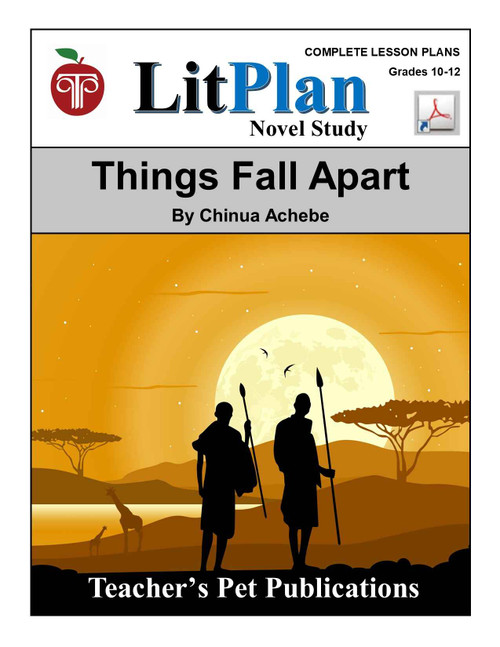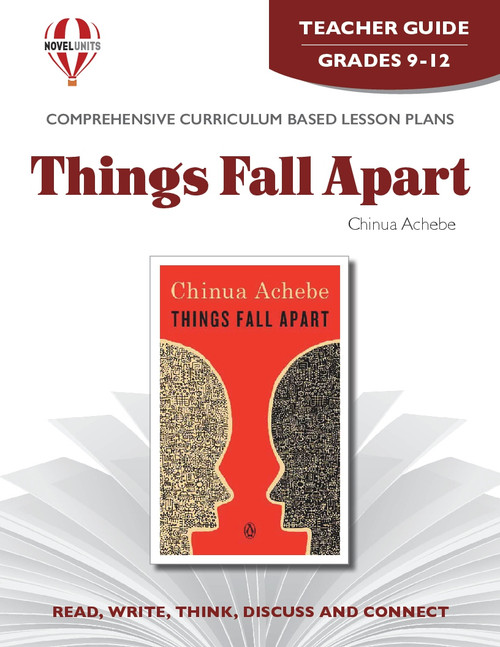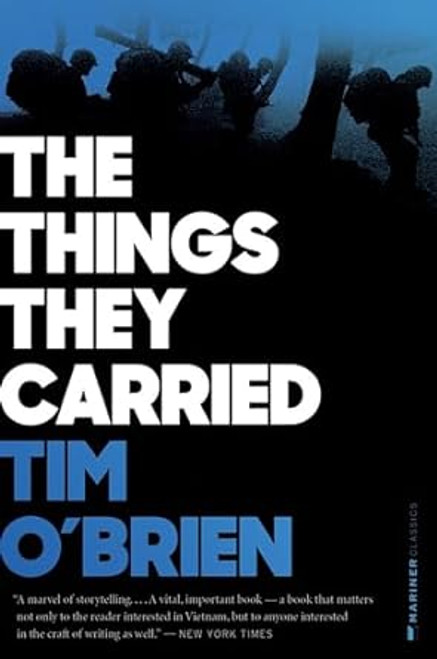Product Overview
Things Fall Apart: When Tradition Clashes with Change
Things Fall Apart promotes an understanding of African culture and colonial impacts, fostering critical thinking about historical and contemporary global issues.
Ordering Books for Things Fall Apart by Chinua Achebe
No order minimum; you can order just one copy if that's all you need! :-) Order your class set of books for Things Fall Apart now, and take advantage of our bulk order discounts!
About the Book Things Fall Apart |
A classic of world literature, Things Fall Apart centers around the life of Okonkwo, a respected leader in the Igbo community of Umuofia in Nigeria. Okonkwo's story begins with his rise to prominence, driven by his fear of being perceived as weak like his father, Unoka. Okonkwo's determination to succeed leads him to become a wealthy farmer, a skilled wrestler, and a fierce warrior. His achievements earn him a high status in his village, but his rigid adherence to traditional values and his quick temper often put him at odds with those around him. Okonkwo's fortunes begin to change when he accidentally kills a clansman during a funeral ceremony. As punishment, he and his family are exiled to his motherland, Mbanta, for seven years. During his exile, Okonkwo witnesses the arrival of European missionaries and the growing influence of colonial rule in Nigeria. The missionaries' introduction of Christianity and Western customs disrupts the traditional Igbo way of life, leading to internal conflicts within the community and challenging Okonkwo's beliefs and values. Upon his return to Umuofia, Okonkwo finds his village deeply divided by the presence of the missionaries and the colonial government. His attempts to rally resistance against the colonizers are met with resistance from his own people, who have begun to accept the new order. Okonkwo's frustration and sense of helplessness culminate in a tragic decision. In a final act of defiance, Okonkwo takes his own life, an act that goes against the very traditions he sought to uphold, symbolizing the disintegration of his world and the broader cultural changes affecting his society.
|
Themes in the book Things Fall Apart |
Tradition versus Change: One of the central themes in Things Fall Apart is the tension between tradition and change. Achebe vividly portrays the impact of colonialism on the Igbo culture, highlighting the clash between traditional customs and the new ways introduced by the Europeans. Through Okonkwo's character, we see the struggle to maintain cultural identity and heritage in the face of external forces that threaten to dismantle them. Fate and Free Will: Fate and free will are recurring themes in Things Fall Apart. Okonkwo's actions and decisions are influenced by his desire to control his destiny and avoid his father's perceived failures. However, the novel suggests that individuals are also shaped by forces beyond their control, such as societal expectations and historical events. Achebe's exploration of fate and free will raises questions about the extent to which individuals can shape their own lives in the face of larger structural forces. Colonialism and Postcolonialism: The impact of colonialism on African societies is a central focus in Things Fall Apart. Achebe presents a nuanced portrayal of the interactions between the Igbo people and the European colonizers. While the arrival of Christianity and Western education brings about positive changes, such as improved healthcare and access to knowledge, it also leads to cultural erasure and loss of autonomy for the Igbo community. The novel also raises questions about postcolonial identity and how individuals navigate their place in a society that has been fundamentally altered by outside forces. The Power of Language: Language plays a crucial role in the novel, reflecting both individual character traits and larger societal dynamics. Okonkwo's use of violence and aggression is mirrored in his language, while the calm and wise words of Obierika represent a different perspective. The introduction of English also has significant implications for the Igbo people, as it becomes a tool for the colonizers to impose their beliefs and values on them. Achebe's use of language in Things Fall Apart underscores its power to shape perceptions and control narratives.
|
Activity Ideas for the book Things Fall Apart |
Understanding Cultural Context: To deepen students' understanding of Things Fall Apart, begin by exploring the cultural context of the Igbo society. Provide background information on Igbo customs, beliefs, and social structures before the arrival of Europeans. Engage students in discussions about the significance of traditions and how they shape individual and community identities. This foundation will help students appreciate the complexities of the novel and the impact of cultural change. Character Analysis: Encourage students to analyze the novel's characters, focusing on their motivations, struggles, and development. Assign groups to create character profiles for key figures like Okonkwo, Nwoye, and Ekwefi. Have students present their findings through creative formats such as character diaries, social media profiles, or mock interviews. This activity will help students develop a deeper understanding of the characters' perspectives and the themes they represent. Collaborative Projects: Assign group projects that encourage students to collaborate and explore different aspects of the novel. For example, students can create multimedia presentations on the impact of colonialism on Igbo society, design visual representations of key scenes, or produce short films based on the novel. These projects will allow students to express their creativity while reinforcing their understanding of the text. Discussion Circles: Facilitate small-group discussions where students can share their thoughts and interpretations of the novel. Provide guiding questions to prompt meaningful conversations, such as "How do Okonkwo's actions reflect his internal conflicts?" or "What role do the missionaries play in the transformation of Umuofia?" Encourage students to listen actively and respect diverse viewpoints. This activity will promote critical thinking and foster a sense of community within the classroom.
|

Customer Service
- We guarantee you'll have the best customer service experience ever with Teacher's Pet Publications.
- We are here to help make things as easy as possible for you!
- Your information is secure. We don't keep your card number on file anywhere, and we don't sell, rent, or give away your personal information.
- We treat you as we would like to be treated as a customer!
- Need help? Have questions? We're always happy to assist you! Contact Us











